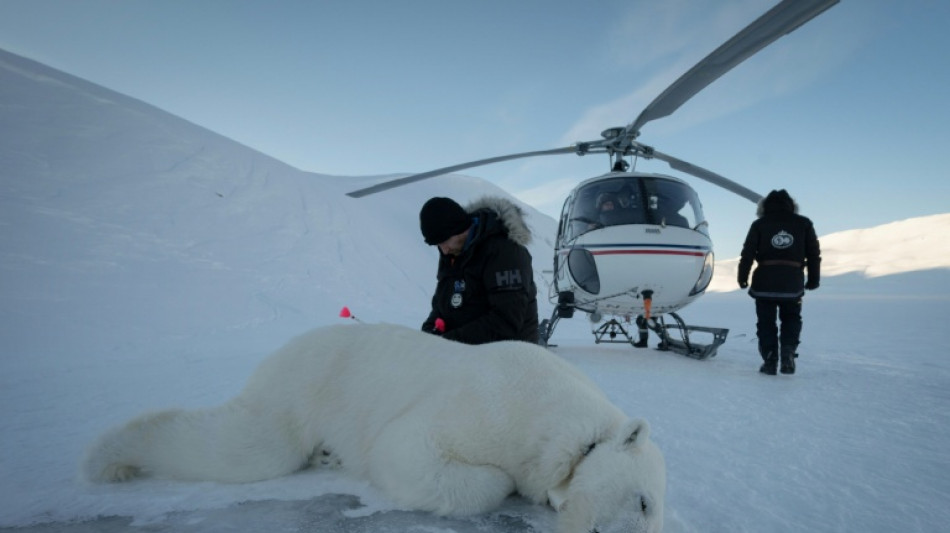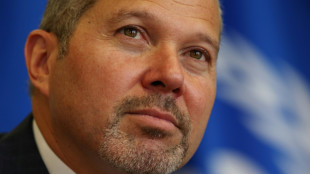
-
 England captain Itoje savours 'special' New Zealand win
England captain Itoje savours 'special' New Zealand win
-
Wales's Evans denies Japan historic win with last-gasp penalty

-
 Zelensky renews calls for more air defence after deadly strike on Kyiv
Zelensky renews calls for more air defence after deadly strike on Kyiv
-
NBA's struggling Pelicans sack coach Willie Green

-
 Petain tribute comments raise 'revisionist' storm in France
Petain tribute comments raise 'revisionist' storm in France
-
Spain on World Cup brink as Belgium also made to wait

-
 Spain virtually seal World Cup qualification in Georgia romp
Spain virtually seal World Cup qualification in Georgia romp
-
M23, DR Congo sign new peace roadmap in Doha

-
 Estevao, Casemiro on target for Brazil in Senegal win
Estevao, Casemiro on target for Brazil in Senegal win
-
Ford steers England to rare win over New Zealand

-
 Massive march in Brazil marks first big UN climate protest in years
Massive march in Brazil marks first big UN climate protest in years
-
Spain rescues hundreds of exotic animals from unlicensed shelter

-
 Huge fire sparked by explosions near Argentine capital 'contained'
Huge fire sparked by explosions near Argentine capital 'contained'
-
South Africa defy early red card to beat battling Italy

-
 Sinner beats De Minaur to reach ATP Finals title match
Sinner beats De Minaur to reach ATP Finals title match
-
Zelensky vows overhaul of Ukraine's scandal-hit energy firms

-
 South Africa defy early red card to beat Italy
South Africa defy early red card to beat Italy
-
Alex Marquez claims Valencia MotoGP sprint victory

-
 McIlroy shares lead with Race to Dubai title in sight
McIlroy shares lead with Race to Dubai title in sight
-
Climate protesters rally in Brazil at COP30 halfway mark

-
 Spike Lee gifts pope Knicks jersey as pontiff meets film stars
Spike Lee gifts pope Knicks jersey as pontiff meets film stars
-
BBC caught in crossfire of polarised political and media landscape

-
 'Happy' Shiffrin dominates in Levi slalom for 102nd World Cup win
'Happy' Shiffrin dominates in Levi slalom for 102nd World Cup win
-
Palestinian national team on 'mission' for peace in Spain visit

-
 Brazilian 'Superman' cheers child cancer patients in Ghana
Brazilian 'Superman' cheers child cancer patients in Ghana
-
India close in on win over South Africa after Jadeja heroics

-
 Huge explosions rock industrial area near Argentina's capital
Huge explosions rock industrial area near Argentina's capital
-
Bezzecchi takes pole for Valencia sprint and MotoGP

-
 Dominant Shiffrin leads after first slalom run in Levi
Dominant Shiffrin leads after first slalom run in Levi
-
Nine killed in accidental explosion at Indian Kashmir police station

-
 Climate protesters to rally at COP30's halfway mark
Climate protesters to rally at COP30's halfway mark
-
Fighting South Africa lose Rickelton after India 189 all out

-
 Harmer leads South Africa fightback as India 189 all out
Harmer leads South Africa fightback as India 189 all out
-
Prison looms for Brazil's Bolsonaro after court rejects his appeal

-
 EU bows to pressure on loosening AI, privacy rules
EU bows to pressure on loosening AI, privacy rules
-
India close in on lead despite South African strikes

-
 Curry's 49 points propel Warriors in 109-108 win over Spurs
Curry's 49 points propel Warriors in 109-108 win over Spurs
-
NZ boxer Parker denies taking banned substance after failed test

-
 Australia setback as Hazlewood ruled out of 1st Ashes Test
Australia setback as Hazlewood ruled out of 1st Ashes Test
-
Australia pace spearhead Josh Hazlewood ruled out of 1st Ashes Test

-
 UN Security Council to vote Monday on Trump Gaza plan
UN Security Council to vote Monday on Trump Gaza plan
-
Japan's Tomono leads after men's short program at Skate America

-
 China tells citizens to avoid Japan travel as Taiwan row grows
China tells citizens to avoid Japan travel as Taiwan row grows
-
Purdue Pharma to be dissolved as US judge says to approve bankruptcy

-
 Iran's first woman orchestra conductor inspires
Iran's first woman orchestra conductor inspires
-
Wood gets all-clear in boost for England

-
 Golf's world No. 8 Thomas has back surgery
Golf's world No. 8 Thomas has back surgery
-
Rebooted Harlem museum celebrates rise of Black art

-
 'Desperation in the air': immigrant comics skewer Trump crackdown
'Desperation in the air': immigrant comics skewer Trump crackdown
-
UN regulator says shipping still wants to decarbonize -- despite US threats


Polar bear biopsies to shed light on Arctic pollutants
With one foot braced on the helicopter's landing skid, a veterinarian lifted his air rifle, took aim and fired a tranquiliser dart at a polar bear.
The predator bolted but soon slumped into the snowdrifts, its broad frame motionless beneath the Arctic sky.
The dramatic pursuit formed part of a pioneering research mission in Norway's Svalbard archipelago, where scientists, for the first time, took fat tissue biopsies from polar bears to study the impact of pollutants on their health.
The expedition came at a time when the Arctic region was warming at four times the global average, putting mounting pressure on the iconic predators as their sea-ice habitat shrank.
"The idea is to show as accurately as possible how the bears live in the wild -- but in a lab," Laura Pirard, a Belgian toxicologist, told AFP.
"To do this, we take their (fatty) tissue, cut it in very thin slices and expose it to the stresses they face, in other words pollutants and stress hormones," said Pirard, who developed the method.
Moments after the bear collapsed, the chopper circled back and landed. Researchers spilled out, boots crunching on the snow.
One knelt by the bear's flank, cutting thin strips of fatty tissue. Another drew blood.
Each sample was sealed and labelled before the bear was fitted with a satellite collar.
Scientists said that while the study monitors all the bears, only females were tracked with GPS collars as their necks are smaller than their heads -- unlike males, who cannot keep a collar on for more than a few minutes.
- Arctic lab -
For the scientists aboard the Norwegian Polar Institute's research vessel Kronprins Haakon, these fleeting encounters were the culmination of months of planning and decades of Arctic fieldwork.
In a makeshift lab on the icebreaker, samples remained usable for several days, subjected to controlled doses of pollutants and hormones before being frozen for further analysis back on land.
Each tissue fragment gave Pirard and her colleagues insight into the health of an animal that spent much of its life on sea ice.
Analysis of the fat samples showed that the main pollutants present were per- and polyfluoroalkyl substances (PFAS) -- synthetic chemicals used in industry and consumer goods that linger in the environment for decades.
Despite years of exposure, Svalbard's polar bears showed no signs of emaciation or ill health, according to the team.
The local population has remained stable or even increased slightly, unlike parts of Canada, where the Western Hudson Bay group declined by 27 percent between 2016 and 2021, from 842 to 618 bears, according to a government aerial survey.
Other populations in the Canadian Arctic, including the Southern Beaufort Sea, have also shown long-term declines linked to reduced prey access and longer ice-free seasons.
Scientists estimate there are around 300 polar bears in the Svalbard archipelago and roughly 2,000 in the broader region stretching from the North Pole to the Barents Sea.
The team found no direct link between sea ice loss and higher concentrations of pollutants in Svalbard's bears. Instead, differences in pollutant levels came down to the bears' diet.
Two types of bears -- sedentary and pelagic -- feed on different prey, leading to different chemicals building up in their bodies.
- Changing diet -
With reduced sea ice, the bears' diets have already started shifting, researchers said. These behavioural adaptations appeared to help maintain the population’s health.
"They still hunt seals but they also take reindeer (and) eggs. They even eat grass (seaweed), even though that has no energy for them," Jon Aars, the head of the Svalbard polar bear programme, told AFP.
"If they have very little sea ice, they necessarily need to be on land," he said, adding that they spend "much more time on land than they used to... 20 or 30 years ago".
This season alone, Aars and his team of marine toxicologists and spatial behaviour experts captured 53 bears, fitted 17 satellite collars, and tracked 10 mothers with cubs or yearlings.
"We had a good season," Aars said.
The team's innovations go beyond biopsies. Last year, they attached small "health log" cylinders to five females, recording their pulse and temperature.
Combined with GPS data, the devices offer a detailed record of how the bears roam, how they rest and what they endure.
Polar bears were once hunted freely across Svalbard but since an international protection agreement in 1976, the population here has slowly recovered.
The team's findings may help explain how the bears' world is changing, and at an alarming rate.
As the light faded and the icebreaker's engines hummed against the vast silence, the team packed away their tools, leaving the Arctic wilderness to its inhabitants.
B.AbuZeid--SF-PST



